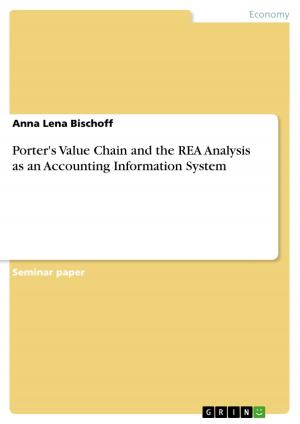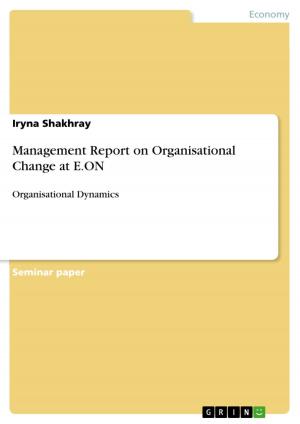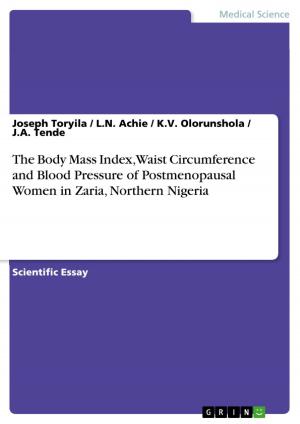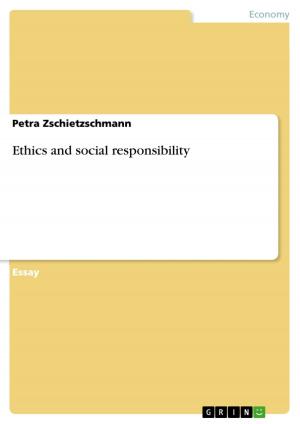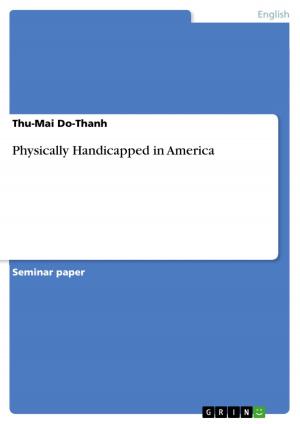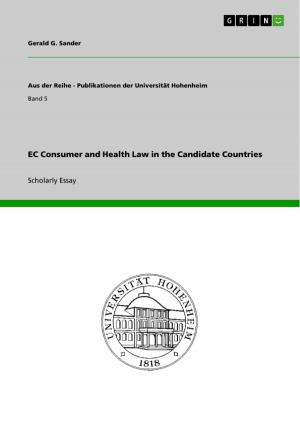Integration or Separation?
Applied Theories of Management Ethics
Nonfiction, Religion & Spirituality, Philosophy, Ethics & Moral Philosophy| Author: | Anonymous | ISBN: | 9783640739882 |
| Publisher: | GRIN Publishing | Publication: | November 3, 2010 |
| Imprint: | GRIN Publishing | Language: | English |
| Author: | Anonymous |
| ISBN: | 9783640739882 |
| Publisher: | GRIN Publishing |
| Publication: | November 3, 2010 |
| Imprint: | GRIN Publishing |
| Language: | English |
Diploma Thesis from the year 2010 in the subject Ethics, grade: 1.7, University of Tubingen (Chair of Bank Management and International Centre for Ethics in the Sciences and Humanities (IZEW)), language: English, abstract: On the one hand, our rapidly developing economy transforms scientific and technological advancement, irreversibility as well as difficult adjustability within liberalizing global activity into powerful instruments for top management of multinational corporations in terms of economic value creation. On the other hand, this economy gathers human beings especially as moral subjects (and not just economical objects); moreover, human beings with diametrically distinct cultural and religious (i.e., moral) orientations. That means, managers necessarily need to apply and justify responsible and consistent use of their instruments (i.e., ethical value creation/consideration). Is this not the case, efficiency principles of so called 'theories of management ethics' relate exclusively to the economic side (but not to the ethical one). At first, this interdisciplinary diploma thesis therefore defines four variables (disciplinary integration, theoretical integration, justification and application), which an integrative or interdisciplinary theory of academic management ethics necessarily needs to have. Second, two concept of management ethics are analyzed, that both rise the claim of being such a theory. The first concept (corporate social performance) is positive-economically biased, whereas the second (integrative management ethics) is normative-ethically biased. The thesis finds, at first, that the former concept completely lacks of justification, whereas application is very high. The latter concept is completely justified but still lacks in application. Secondly, disciplinary integration and theoretical integration are positive correlated to application and justification until a certain degree. Third, the cognitive state of universalethical- principle orientation must be set as the presupposition for the formulation of theories of integrative or interdisciplinary management ethics within academia.
Diploma Thesis from the year 2010 in the subject Ethics, grade: 1.7, University of Tubingen (Chair of Bank Management and International Centre for Ethics in the Sciences and Humanities (IZEW)), language: English, abstract: On the one hand, our rapidly developing economy transforms scientific and technological advancement, irreversibility as well as difficult adjustability within liberalizing global activity into powerful instruments for top management of multinational corporations in terms of economic value creation. On the other hand, this economy gathers human beings especially as moral subjects (and not just economical objects); moreover, human beings with diametrically distinct cultural and religious (i.e., moral) orientations. That means, managers necessarily need to apply and justify responsible and consistent use of their instruments (i.e., ethical value creation/consideration). Is this not the case, efficiency principles of so called 'theories of management ethics' relate exclusively to the economic side (but not to the ethical one). At first, this interdisciplinary diploma thesis therefore defines four variables (disciplinary integration, theoretical integration, justification and application), which an integrative or interdisciplinary theory of academic management ethics necessarily needs to have. Second, two concept of management ethics are analyzed, that both rise the claim of being such a theory. The first concept (corporate social performance) is positive-economically biased, whereas the second (integrative management ethics) is normative-ethically biased. The thesis finds, at first, that the former concept completely lacks of justification, whereas application is very high. The latter concept is completely justified but still lacks in application. Secondly, disciplinary integration and theoretical integration are positive correlated to application and justification until a certain degree. Third, the cognitive state of universalethical- principle orientation must be set as the presupposition for the formulation of theories of integrative or interdisciplinary management ethics within academia.




